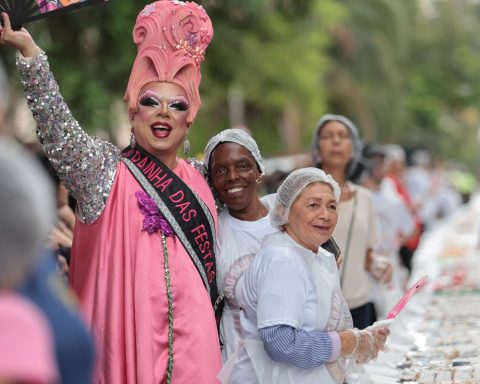The legislation that made it possible for domestic workers to access rights that, until then, were restricted to other formal workers completed 10 years. A Household PEC was the subject of the public hearing of the Commission on Human Rights this Monday (17).
In the evaluation of the audience participants, the difficulties in accepting the changes foreseen in the legislation result from the slavery culture that still persists in Brazil.
The president of the Instituto Doméstica Legal, Mário Avelino, criticized those who say that the new legislation in favor of domestic workers would have resulted in an increase in informal work. “It has been said that informality has increased. In fact, it increased, but it was not because of PEC 72 or the Complementary Law 150. These legislations are good for the employee and also for the employer, because they gave him legal certainty, ”she said.
With Social Security data, Avelino said that, in July 2015, around 1.19 million employers collected the contribution to the National Institute of Social Security (INSS) from their employees with a formal contract. “As of December 2019, that number has increased to 1.58 million employers [recolhendo o eSocial]. That is, there were 390 thousand more, ”he said.
And he adds that, more recently, informality has actually increased. “But the great villain was the economic crisis of 2016 and 2019, aggravated by the covid-19 pandemic. So much so that, in 2020 alone, domestic employment lost 1.7 million jobs, both formal and informal,” he argued.
With vaccination, according to him, a recovery of these numbers is already identified. “Today there is a deficit, compared to the 2019 pre-pandemic, of 500,000 jobs. But I repeat, it was neither the law nor the PEC responsible for this”, reaffirmed the president of the Instituto Doméstica Legal.
Avelino alerted to the cases of employees who are afraid to sign a portfolio for fear of losing the right to Bolsa Família. “There is a lack of clarification policy that this does not necessarily proceed, since the program considers the family’s per capita income”, he said.
Profile
According to the Public Prosecutor’s Office for Labor Thiago Lopes de Castro, cases of rescue of maids who live in a situation analogous to slavery are very common. And it presented a profile of domestic workers. “We are talking about a category that, according to the IBGE [Instituto Brasileiro de Geografia Estatística]has 6.2 million workers, 92% women and 65% black”, he said.
“Among women, they are usually girls taken to be raised by the family, at 8, 10 or 12 years old. Many are withdrawn from school, that is, they are victims of school evasion and suffer damage to their training”, he said when associating, as one of the main causes of slave labor, the vulnerability of the victims.
These girls, due to school impairment, “are subjected to work analogous to slavery, underemployment or informal work, in addition to long working hours, mistreatment, physical and psychological violence, moral and sexual harassment”, he added.
In the case of male victims of this type of exploitation, he said that most cases occur in the countryside, generally affecting the elderly or people with disabilities. “In common, between female and male victims, the fact that they do not receive remuneration or minimal remuneration, without the minimum decent living conditions”.
“There are many cases of permanent, lifelong victims having their lives stolen from childhood. It becomes the objectification of the human being, treated as mere objects of that family, without any rights”, he highlighted.
Labor tax auditor and representative of the National Union of Labor Tax Auditors (Sinait) Teresinha de Laisieux Rodrigues criticized the lack of support given to blacks after the Áurea Law, which ended up reflecting on the option, on the part of society, to deny rights such as a formal contract, 44-hour workday, overtime, night shift or FGTS, among other rights.
“We need, first of all, to educate society to respect these rights”, said the auditor, also remembering cases of work analogous to slavery, caught in wineries in Rio Grande do Sul. According to her, in general, what is observed is that “outsourced companies are the ones that most use work in conditions analogous to slavery”.
Public policy
Still according to the tax auditor, Brazil needs to create policies aimed at rescuing domestic workers after a life of servitude to the family that raised them. “We don’t have a post-rescue policy. It is impossible for the Brazilian State to think that it is enough to remove a worker from a family to which she was delivered, abandon her and offer only three installments of unemployment insurance. This is cruel.”
“We cannot try to correct violence with violence. We defend it, and we are going to send a proposal for a continued benefit, so that this rescued worker has a salary”, said the Sinait representative. The proposal immediately received support from parliamentarians.
Thiago de Castro, from the Public Ministry of Labor (MPT), highlighted some necessary measures to change the situation of domestic workers in the country. “The first is the increase in public policies to combat child labor, in particular domestic child labor”, he defended when demanding, furthermore, the strengthening of labor tax audit staff.
“We also need public policies of integral assistance to the victims, offering housing, post-rescue food and psychological assistance, since these victims suffer great economic and psychological dependence on the exploiting family, and have difficulties to leave that situation” , he added.
The prosecutor also defended medical and dental care; legal and educational advice to the victims, “in order to restore the educational deficit suffered”, as well as financial advice, because many have no idea how to manage their own money.
“In current times, advice is also needed for digital inclusion”, he added.
The representative of the Union of Domestic Workers of the Federal District Samara Regina da Silva Nunes spoke about the difficulties, in the Legislative, for the approval of the law, 10 years ago.
“If we hadn’t persisted, she wouldn’t have left,” he said.
Samara also recalled that members of the Jair Bolsonaro government were among those opposed to granting rights to maids. “There was even a speech by the Minister of Economy [Paulo Guedes], who thought it was absurd for maids to go to Disney. We suffered a lot because we knew there was something there wanting to take away our conquered rights”, she said.















